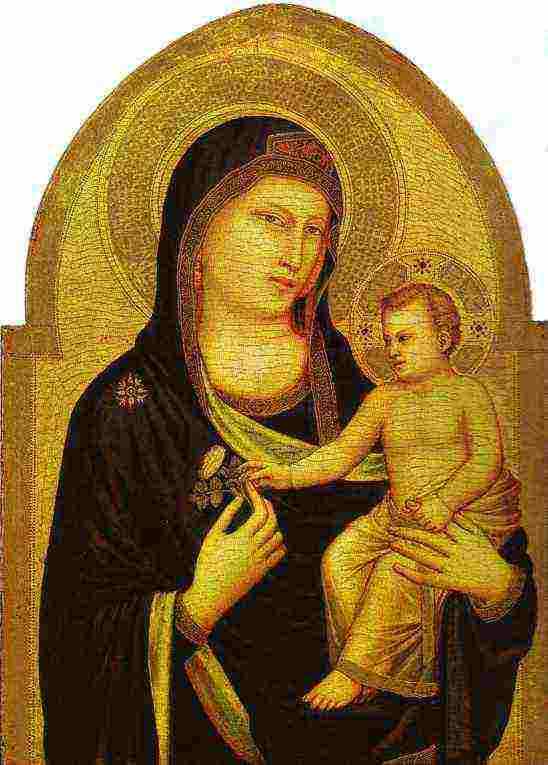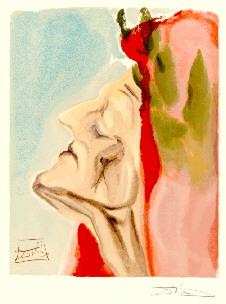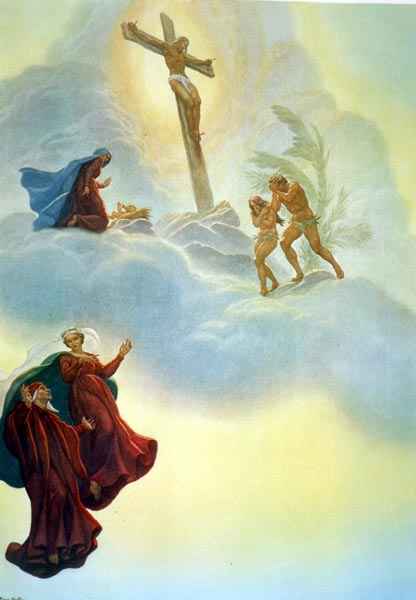 |
 |
 |
|
|
|
|
 |
 |
 |
|
|
|
|
| PAR07 |
|
|
|
|
| ........... | ....... G.GUAITA |
................................. H.W.LONGFELLOW |
...... .D.ALIGHIERI |
....... ... | ....... |
| 1
|
"Ozànna,
sànctus
Déus
sabaòth, superillùstrans claritàte tùa felìces ìgnes hòrum malacòth!". |
"Osanna
sanctus Deus Sabaoth, Superillustrans claritate tua Felices ignes horum malahoth!" In this wise, to
his melody
returning, And to their
dance this and
the others moved, |
«Osanna, sanctus Deus sabaòth, superillustrans claritate tua felices ignes horum malacòth». |
| 4
|
Cuzì
balè
al
rìtmu
dal
so cant, cul'ànima da mi l'è stàta vìsta che l'àva adzùra lé na dùpia lùce; |
Così, volgendosi
a la nota sua, fu viso a me cantare essa sustanza, sopra la qual doppio lume s'addua: |
|
| 7
|
e
ansèma
lé
'nche
i
àuti i pìu 'l pas, e tam mè velucìsimi falòspi, ién scumparì prëstu 'n luntanànsa. |
ed essa e
l'altre
mossero a sua danza, e quasi velocissime faville, mi si velar di sùbita distanza. |
|
| 10
|
Stand
an
dübi
i
dizìva:"Dìji,
dìji!" 'ntra mi:"Dìi", i dizìva a la mè dòna che 'm gàva sémp la séi dla verità. |
Doubting
was I, and saying, "Tell her, tell her," Within me, "tell her," saying, "tell my Lady," Who slakes my thirst with her sweet effluences; And yet that
reverence which
doth lord it over Short while did
Beatrice
endure me thus; |
Io
dubitava e dicea
'Dille, dille!' fra me, 'dille', dicea, 'a la mia donna che mi diseta con le dolci stille'. |
| 13
|
Ma
dla
géna
che
'm
pìa tàntu fort numèc che i sénta dì e 'Be' ed 'Ice', ia stàva a tèsta 'n giü mè 'm piéisa sogn. |
Ma quella
reverenza
che s'indonna di tutto me, pur per Be e per ice, mi richinava come l'uom ch'assonna. |
|
| 16
|
Nén
tant
l'è
supurtàmi
Beatrìs ma suridénd cumìncia 'nt' na manéra che 'n mès al föc farìa n om felìce: |
Poco
sofferse me
cotal Beatrice e cominciò, raggiandomi d'un riso tal, che nel foco faria l'uom felice: |
|
| 19
|
"Secònd
lònche
infalibilmént
i
péns, mè giüsta pünisiòn, giüstamént ànche füisa pünìa, at dà mutìv 'd pensè; |
"According
to infallible advisement, After what manner a just vengeance justly Could be avenged has put thee upon thinking, But I will
speedily thy mind
unloose; By not enduring
on the power
that wills |
«Secondo mio
infallibile avviso, come giusta vendetta giustamente punita fosse, t'ha in pensier miso; |
| 22
|
ma
mi
't
lìbar
da
's dübi la to mént; ti sta atént che adès i me paròli 't faràn regàl 'd na bèla verità. |
ma io ti
solverò
tosto la mente; e tu ascolta, ché le mie parole di gran sentenza ti faran presente. |
|
| 25
|
Par
nén
avéj
vulü',
a
so vantàgi, frenè la vuluntà, l'om nén nasì, l'ha danà ansèma lü la disendénsa; |
Per non
soffrire
a la virtù che vole freno a suo prode, quell'uom che non nacque, dannando sé, dannò tutta sua prole; |
|
| 28
|
da
lì
la
spécie
ümàn'a,
tànti sécui l'è stàta an grand erùr, fin che al Vèrbu piazìi l'è nén 'd calè giü 'nsla tèra |
Whereby
the human species down below Lay sick for many centuries in great error, Till to descend it pleased the Word of God To where the
nature, which
from its own Maker Now unto what is
said direct
thy sight; |
onde
l'umana specie
inferma giacque giù per secoli molti in grande errore, fin ch'al Verbo di Dio discender piacque |
| 31
|
'ndùa
che
la
natüra
zluntanàsi an témp dal creatùr, a lü l'è ünìsi mèc par l'etèrnu amùr tra 'l Pari e 'l Fiö. |
u' la
natura, che
dal suo fattore s'era allungata, unì a sé in persona con l'atto sol del suo etterno amore. |
|
| 34
|
Adès
sta
atént
al
mè
razunamént: sa natüra cungiünta al creatùr, pén'a creà, l'éra sincéra e püra; |
Or drizza
il viso
a quel ch'or si ragiona: questa natura al suo fattore unita, qual fu creata, fu sincera e buona; |
|
| 37
|
ma
par
la
so
cùlpa
mandà l'è stàta via dal paradìs parchè la strà lé lasà l'àva dla verità e dla vìta. |
But
by itself alone was banished forth From Paradise, because it turned aside Out of the way of truth and of its life. Therefore the
penalty the
cross held out, And none was ever
of so great
injustice, |
ma per
sé
stessa pur fu ella sbandita di paradiso, però che si torse da via di verità e da sua vita. |
| 40
|
La
pünisiòn
dònca
ca
l'è
dat la crus, se la parsòn'a asünta dès sa mzüra, ansün'a maj mè lé l'é stàta giüsta; |
La pena
dunque che
la croce porse s'a la natura assunta si misura, nulla già mai sì giustamente morse; |
|
| 43
|
ma
vardànd
la
persòn'a
che
l'ha patì che l'éra saldà 'nsèma a tal natüra, 'nsün'a ànche stàta l'è tant ingiüriùza. |
e
così nulla
fu di tanta ingiura, guardando a la persona che sofferse, in che era contratta tal natura. |
|
| 46
|
Cuzì
'n
fat
l'ha
cauzà
ròbi divèrsi: cuntént Dìu e i Giüdé na mort l'ha fat; par léi trëma la tèra e 's dörv al cél. |
From
one act therefore issued things diverse; To God and to the Jews one death was pleasing; Earth trembled at it and the Heaven was opened. It should no
longer now seem
difficult But now do I
behold thy mind
entangled |
Però d'un
atto uscir cose diverse: ch'a Dio e a' Giudei piacque una morte; per lei tremò la terra e 'l ciel s'aperse. |
| 49
|
Pü
nén
dév
fèti
adès
dificultà quànd as dis che na giüsta pünisiòn l'è giüst che 'n tribünàl l'àbia pünìla. |
Non ti
dee oramai
parer più forte, quando si dice che giusta vendetta poscia vengiata fu da giusta corte. |
|
| 52
|
Ma
i
vëd
che
da
'n pensé pasànd a n àut a t'è 'ngarbià la mént andrén an grup, e na gran vòja t'è da vnìni fòra. |
Ma io
veggi' or la
tua mente ristretta di pensiero in pensier dentro ad un nodo, del qual con gran disio solver s'aspetta. |
|
| 55
|
Ti
't
dìzi:"
Cul
che
i sént lu capìs bén; ma parchè Dìu 'l vuléisa ancù l'è scüri, par fè la redensiòn giüst sa manéra. |
Thou
sayest, 'Well discern I what I hear; But it is hidden from me why God willed For our redemption only this one mode.' Buried remaineth,
brother,
this decree Verily, inasmuch
as at this
mark |
Tu dici:
"Ben discerno
ciò ch'i' odo; ma perché Dio volesse, m'è occulto, a nostra redenzion pur questo modo". |
| 58
|
'S
decrét
divìn,
o
car,
'l rèsta 'n mistéru par i öc' di cuj che iàn nén la so mént antla fiàma scaudà dl'amùr di Dìu. |
Questo
decreto, frate,
sta sepulto a li occhi di ciascuno il cui ingegno ne la fiamma d'amor non è adulto. |
|
| 61
|
Ma
sicùme
l'è
tant
che
snu discüt, ma l'è nén che 's capìsa tàntu bén, ta spiég parchè l'è dëgna sa manéra. |
Veramente, però
ch'a questo segno molto si mira e poco si discerne, dirò perché tal modo fu più degno. |
|
| 64
|
La
divìn'a
buntà
che
sémp
al mal la zluntàn'a da lé, lùce d'amùr zlàrga e difònd an tüti i blësi etèrni; |
Goodness
Divine, which from itself doth spurn All envy, burning in itself so sparkles That the eternal beauties it unfolds. Whate'er from
this immediately
distils Whate'er from
this immediately
rains down |
La divina
bontà,
che da sé sperne ogne livore, ardendo in sé, sfavilla sì che dispiega le bellezze etterne. |
| 67
|
cul
che
da
lé
diretamént
derìva lìbar l'è tüt, parchè lü, a l'inflüénsa nén sugèt a l'è di secùndi càuzi; |
Ciò che da
lei sanza mezzo distilla non ha poi fine, perché non si move la sua imprenta quand'ella sigilla. |
|
| 70
|
Cul
che
da
lé
diretamént
al piöv, l'ha pü nén fin, parchè pü nén scumpàr l'imprònta ca l'è fài cul sigìl; |
Ciò che da
essa sanza mezzo piove libero è tutto, perché non soggiace a la virtute de le cose nove. |
|
| 73
|
par
èsi
pü
cunfùrm
a
lü, pü i piàs e l'ardùr ad carità che tüt fa spléndi an cul che pü ia zmìa, pü l'è viv. |
The
more conformed thereto, the more it pleases; For the blest ardour that irradiates all things In that most like itself is most vivacious. With all of these
things
has advantaged been 'Tis sin alone
which doth
disfranchise him, |
Più l'è
conforme, e però più le piace; ché l'ardor santo ch'ogne cosa raggia, ne la più somigliante è più vivace. |
| 76
|
Ad
tüti
si
virtü'
bén
s'avantàgia l' ümàn'a creatüra; e se mèc iün'a nu mànca, tüta pèrd so nubiltà. |
Di tutte
queste dote
s'avvantaggia l'umana creatura; e s'una manca, di sua nobilità convien che caggia. |
|
| 79
|
La
pèrd
la
libertà
mèc
quànd la pèca e ménu zmìa alùra al pü gran Bén parchè pü nén l'è ilüminà dla lùce; |
Solo il
peccato è
quel che la disfranca e falla dissìmile al sommo bene, per che del lume suo poco s'imbianca; |
|
| 82
|
e
maj
pudrà
riavéj
la
dignità se 'l vöid l'impinìs nén dal so pecà pagànd cul piazì gram cun pén'i giüsti. |
And
to his dignity no more returns, Unless he fill up where transgression empties With righteous pains for criminal delights. Your nature when
it sinned
so utterly Nor could itself
recover,
if thou notest |
e in sua
dignità
mai non rivene, se non riempie, dove colpa vòta, contra mal dilettar con giuste pene. |
| 85
|
Vòsa
natüra
quànd
ancùra
'ntéra, 'ntal so prugenitùr a l'ha pecà dignità e paradìs a l'ha pardü'; |
Vostra
natura, quando
peccò tota nel seme suo, da queste dignitadi, come di paradiso, fu remota; |
|
| 88
|
né
l'avrìa
pudü'
ricüperèla, pénsa bén, par ansün' àuta vìa, se nén entrànd par iün di si pasàgi: |
né
ricovrar
potiensi, se tu badi ben sottilmente, per alcuna via, sanza passar per un di questi guadi: |
|
| 91
|
o
che
Dìu,
'ntla
so
magnificénsa 'l pardunéisa; o che l'om, 'd so vuluntà, al sudisféisa al mal che l'àva fat. |
Either
that God through clemency alone Had pardon granted, or that man himself Had satisfaction for his folly made. Fix now thine eye
deep into
the abyss Man in his
limitations had
not power |
o che Dio
solo per
sua cortesia dimesso avesse, o che l'uom per sé isso avesse sodisfatto a sua follia. |
| 94
|
Dès
fìsa
i
to
öc'
giü 'ndrénta l'abìs dal giüdìsi di Dìu, pü che 't pödi, e stàmi bén tacà sénsa lasèmi. |
Ficca mo
l'occhio
per entro l'abisso de l'etterno consiglio, quanto puoi al mio parlar distrettamente fisso. |
|
| 97
|
'L
pudìva
nén,
anti
so
limit, l'om mai sudisfè, par nén pudéi 'ndè giü, cun ümiltà e übidiénsa cuzì tant, |
Non potea
l'uomo
ne' termini suoi mai sodisfar, per non potere ir giuso con umiltate obediendo poi, |
|
| 100
|
'd
quànd
l'àva
'ndàta
sü,
dizübidénd; perciò dal sudisfè dasparlü l'om 'l düvìva par giüstisia èsi esclüs. |
Far
as he disobeying thought to rise; And for this reason man has been from power Of satisfying by himself excluded. Therefore it God
behoved
in his own ways But since the
action of the
doer is |
quanto
disobediendo
intese ir suso; e questa è la cagion per che l'uom fue da poter sodisfar per sé dischiuso. |
| 103
|
Donc,
par
i
so
vìi,
'l düvìva Dìu antla so gràsia prìma ripurtèlu, i dis cun iün'a o ànche tüti dùi. |
Dunque a
Dio convenia
con le vie sue riparar l'omo a sua intera vita, dico con l'una, o ver con amendue. |
|
| 106
|
Ma
parchè
l'è
n'asiòn
tant
püsè càra a chi lu fa, quànt pü la cuntén dla buntà 'd cör ad chi s'asiòn l'è fàla, |
Ma perché
l'ovra
tanto è più gradita da l'operante, quanto più appresenta de la bontà del core ond'ell'è uscita, |
|
| 109
|
la
divin'a
buntà
cl'è
'l
sigìl dal mond, ad prucédi lé cun tüti i so vìi, par redimìvi vuj l'è stat cunténta. |
Goodness
Divine, that doth imprint the world, Has been contented to proceed by each And all its ways to lift you up again; Nor 'twixt the
first day
and the final night For God more
bounteous was
himself to give |
la divina
bontà
che 'l mondo imprenta, di proceder per tutte le sue vie, a rilevarvi suso, fu contenta. |
| 112
|
'Ntal
témp
tra
'l
prinsìpi
e la fin dal mond n'òpera tant grànda maj l'è stài o par l'ün'a o par l'àuta, né i sarà; |
Né
tra l'ultima
notte e 'l primo die sì alto o sì magnifico processo, o per l'una o per l'altra, fu o fie: |
|
| 115
|
che
Dìu,
pü
generùs,
l'è
dàsi lü par fè l'om süficént ausèsi sü che se l'avéisa lü tüt pardunà; |
ché più
largo fu Dio a dar sé stesso per far l'uom sufficiente a rilevarsi, che s'elli avesse sol da sé dimesso; |
|
| 118
|
e
i
àuti
vìi
tüti
iéru scàrsi, vardànd la giüstisia, se 'l Fiö di Diu füisa nen ümiliàsi ad incarnèsi. |
And
all the other modes were insufficient For justice, were it not the Son of God Himself had humbled to become incarnate. Now, to fill
fully each desire
of thine, Thou sayst: 'I
see the air,
I see the fire, |
e tutti
li altri
modi erano scarsi a la giustizia, se 'l Figliuol di Dio non fosse umiliato ad incarnarsi. |
| 121
|
Dès
parchè
't
sìi
sudisfàt
dal tüt, iù 'ncu quaicòs che 'm rèsta da spieghèti; pö tüt at sarà ciàr mè lu vëd mi. |
Or per
empierti bene
ogni disio, ritorno a dichiararti in alcun loco, perché tu veggi lì così com'io. |
|
| 124
|
Ti
't
dìzi:'Mi
i
vëd
l'àqua, i vëd al föc, l'ària e la tèra e tüti i so cumpòst, che i vén'u an curüsiòn e i düru poc; |
Tu dici:
"Io veggio
l'acqua, io veggio il foco, l'aere e la terra e tutte lor misture venire a corruzione, e durar poco; |
|
| 127
|
ànche
si
ròbi
l'è
creài
Dìu; se donc l'è véra lònche iùma dit, an curüsiòn duvrìu nén andè'. |
And
these things notwithstanding were created;' Therefore if that which I have said were true, They should have been secure against corruption. The Angels,
brother, and
the land sincere But all the
elements which
thou hast named, |
e queste
cose pur
furon creature; per che, se ciò ch'è detto è stato vero, esser dovrien da corruzion sicure". |
| 130
|
I
àngiai,
fratèl,
e
i
céj andùa t'è che ién sincér, i son creà, 's pöl dì , antér, perfèt, mè ién an verità; |
Li
angeli, frate,
e 'l paese sincero nel qual tu se', dir si posson creati, sì come sono, in loro essere intero; |
|
| 133
|
ma
i
elemént
che
ti
t'è numinà e i ròbi che i rizültu fàti 'd lur, da na virtü' creà fùrma i ricévu. |
ma
li elementi
che tu hai nomati e quelle cose che di lor si fanno da creata virtù sono informati. |
|
| 136 | Creà
l'è
la
matéria
che
lur iàn; creà l'è la virtü' che fùrma i dà 'nti si stéili che i gìru antùrn a lur. |
Created
was the matter which they have; Created was the informing influence Within these stars that round about them go. The soul of every
brute and
of the plants But your own life
immediately
inspires |
Creata fu la
materia ch'elli hanno; creata fu la virtù informante in queste stelle che 'ntorno a lor vanno. |
| 139 | L'ànima
par
i
bèstji
e
'par i piànti tìru fòra da lur lonch' iè già 'n puténsa al rag' e 'l muvimént di lùci sànti; |
L'anima
d'ogne bruto
e de le piante di complession potenziata tira lo raggio e 'l moto de le luci sante; |
|
| 142 | méntre
la
vòsa
vìta,
par
vìa dirèta a vlu dà al Bén pü grand; che ànche, tant 'd lü lu inamùra, che sémp pö lu cèrca. |
ma vostra
vita sanza
mezzo spira la somma beninanza, e la innamora di sé sì che poi sempre la disira. |
|
| 145 | E
ànche
't
pödi
avéj
da chi la pròva 'd vòsa resüresiòn; bàsta che 't pénsi che l'è la carn a dl'om stàta furmà |
And
thou
from
this
mayst
argue furthermore Your resurrection, if thou think again How human flesh was fashioned at that time |
E quinci
puoi argomentare
ancora vostra resurrezion, se tu ripensi come l'umana carne fessi allora |
| 148 | 'ntal témp che i prim parént ién stat creà. | When the first parents both of them were made." | che li primi parenti intrambo fensi». |